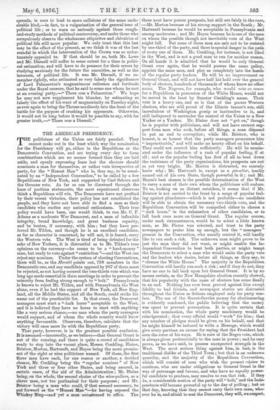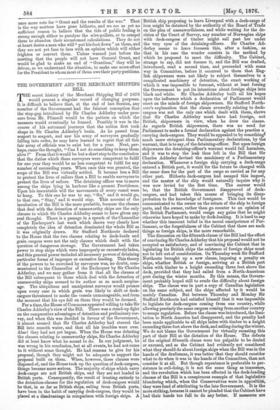THE AMERICAN PRESIDENCY.
TH'politicians of the Union are fairly puzzled. They cannot make out in the least which way the nomination for the Presidency will go, either in the Republican or the Democratic Convention, and are trying every day to form combinations which are no sooner formed than they are laid aside, and openly expressing fears lest the electors should nominate a man for themselves, or rather vote irrespective of party, for the " Honest Man" who is, they say, to be nomi- nated by an " Independent Convention," to be called by a few Republicans of New York, and supported by Carl Schurz and the German vote. As far as can be discerned through the haze of partisan statements, the most experienced observers think a Republican will win. The Democrats have not profited by their recent victories, their policy has not conciliated the people, and they have not been able to find a man as their candidate who excites any national enthusiasm. Their true policy would have been, one would think, to run Mr. C. F. Adams as a moderate War Democrat, and a man of inflexible integrity, broad knowledge, and great business capacity, and be beaten, if necessary, with him ; but they have pre- ferred Mr. Tilden, and though he is an excellent candidate, as far as character is concerned, he will not, it is feared, carry the Western vote. The West is tired of being defeated for the sake of New Yorkers, it is distrustful as to Mr. Tilden's true opinions on the currency—he seems to be a " hard-money " man, but ready to vote against "restriction "-and the West can reject any nominee. Under the system of electing Conventions, there will be, as the Herald points out, 788 members in the Democratic one, and any candidate opposed by 267 of them must be rejected, as not having secured the two-thirds vote which was long ago made essential in these meetings in order to prevent the minority from feeling strong enough to " bolt." Pennsylvania is known to reject Mr. Tilden, and with Pennsylvania the West alone, even if he had the support of New York, all Slew Eng- land, all the Middle States, and all the South, could strike his name out of the practicable list. In that event, the Democrat managers must start a "dark horse" acceptable to the West, and it is believed they have no horse to start with anything like a very serious chance,—no man whom the party managers would support, and of whom the whole country would know anything favourable. Observers, therefore, calculate that the victory will once more lie with the Republican party.
That party, however, is in the greatest possible confusion. It is assumed—incorrectly, as we believe—that General Grant is out of the running, and there is quite a crowd of candidates ready to step into the vacant place, Messrs. Conkling, Blaine, Bristow, Morton, Hartranft, and Hayes being the more promin- ent of the eight or nine politicians named. Of these, the first three men have each, for one reason or another, a decided chance, Mr. Conkling being the " regular nominee " of New York and three or four other States, and being assured, in certain cases, of the aid of the Administration ; Mr. Blaine being, on the whole, the second choice of the wire-pullers, as a clever man, not too puritanical for their purposes ; and Mr. Bristow being a man who could, if that seemed necessary, be put forward as the " Honest Man "—he having exposed the Whiskey Ring—and yet a man accustomed to office. The three next have poorer prospects, but still are fairly in the race, —Mr. Morton because of his strong support in the South ; Mr. Hartranft because he would be acceptable in Pennsylvania and among moderates ; and Mr. Hayes because he is one of the men on whom the possible though not inevitable vote of the West might fall. But none of these men are safe not to be resisted by one-third of the party, and there is special danger in the path of every one of them. Mr. Conkling, for instance, is not liked in the West, and is not a good man to run for another reason. On all hands it is admitted that he would be only General Grant over again, that he would pursue the same policy, appoint the same men, and play as completely into the hands of the regular party leaders. He will be no improvement on General Grant, and will not have half his hold over the general body of electors, hundreds of thousands of whom know no other name. The Negroes, for example, who would vote en masse for a Republican in possession of the White House, would not be moved in the least by Senator Conkling's name. Their vote is a heavy one, and so is that of the poorer Western electors, who are still proud of the Illinois tanner's son, still incredulous of Washington gossip or inattentive to it, and still indisposed to surrender the control of the Union to a New Yorker or a Yankee. Mr. Blaine does not " get on," though he is popular with politicians, and will not have earnest sup- port from men who seek, before all things, a. man disposed to put an end to corruption; while Mr. Bristow, who is honest, is so honest that the party managers pronounce him " impracticable," and will make no hearty effort on his behalf. They could not control him sufficiently. He will be nomin- ated under the influence of a rush of popular feeling, if at all ; and as the popular feeling has first of all to beat down the resistance of the party organisations, his prospects are not as yet very bright. Mr. Morton is distrusted, we scarcely know why ; Mr. Hartranft is, except as a pis-aller, hardly named out of his own State, though powerful in it ; and Mr. Hayes's best chance is the possible determination of the West to carry a man of their own whom the politicians will endure. To us, looking on as distant outsiders, it seems that if Mr. Bristow is not carried to the front by a surge of popular feel- ing against plunderers—which is not probable—no candidate will be able to obtain the necessary two-thirds vote, and the Republican Convention will be compelled either to choose a " dark horse," in the exhaustion of other candidates, or to fall back once more on General Grant. The regular course, under such circumstances, would be to select a little known man, as Mr. Pierce was selected, and trust to the party newspapers to praise him up enough, but the " managers " present in the Convention, who usually control it, will hardly like to run such a risk. The unknown man might prove to be just the man they did not want, or might enable the In- dependent Convention to beat both parties, or might tempt the Democrats to select a man who would unite the party vote and the leaders who desire, before all things, as they say, to " cleanse the White House." The majority in the Republican Convention will hardly run such a risk ; and if they do not, they have no one to fall back upon but General Grant. It is by no means certain, as the New Hampshire election recently showed, that his popularity with the mass of electors has come finally to an end. Nothing has ever been proved against him except fidelity to bad friends, and newspaper stories are distrusted throughout the Union as fictions employed only for party war- fare. The use of the Secret-Service money for electioneering is evidently condoned, the public believing that the money was spent to prevent personation. It is quite certain that with his nomination, the whole party machinery would be reinvigorated ; that every official would "work" for him ; that any number of pledges would be given on his behalf, and that he might himself be induced to write a Message, which would give every partisan an excuse for saying that the President had seen the error of his ways. He is sure of the Negro vote, which is always given preferentially to the man in power ; and he may prove, as we have said, to possess unexpected strength in the West. The most serious thing against him, in fact, is the traditional dislike of the Third Term ; but that is an unknown quantity, and the majority of the Republican Convention, which will consist of men who wish the present regime to continue, who are under obligations to General Grant in the way of patronage and favour, and who have no equally power- ful candidate to produce, may resolve to run that risk. If they do, a considerable section of the party will "bolt," and the Inde- pendents will become powerful up to the day of polling ; but on that day, knowing that they cannot carry their own man, who- ever he is, and afraid to seat the Democrat, they will, we suspect,
once more vote for " Grant and the results of the war." That is the way matters have gone hitherto, and we see as yet no sufficient reason to believe that the tide of public feeling is strong enough either to paralyse the wire-pullers, or to compel them to abandon their accustomed calculations. They do not at heart desire a man who will " put his foot down " on them, and they are not yet face to face with an opinion which will either frighten or convert them. Unless warned just before the meeting that the people will not have General Grant, and would be glad to make an end of " Grantism," they will be driven, as we understand the situation, to make one more effort for the President to whom most of them owe their party positions.



































 Previous page
Previous page